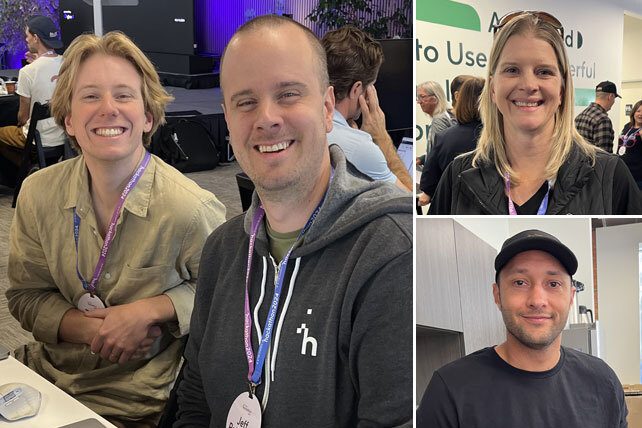What if you had a technological solution that could dramatically heighten your church’s security during the hubbub of your Sunday morning service? Or could flag behaviors in your church members that indicate they might become suicidal? Or what if you could translate your sermon into another language—with lip syncing—within a matter of hours?
These were all solutions using artificial intelligence that were developed at the second annual AI & the Church Hackathon held by leading technology platform, Gloo, in Boulder, Colorado, on Sept. 13-15. The theme of this year’s hackathon was “Redemptive Technology,” and attendees from the U.S. and other countries came together on teams to compete for cash prizes by creating AI solutions that will support human flourishing and thriving churches.
“We just love church leaders and that’s why we’re here,” Gloo CEO and co-founder Scott Beck told ChurchLeaders. “We’re bringing together a bunch of technologists in order to be able to innovate together to be able to help churches better thrive and help them help their members, their congregants, their people to better flourish.”
“And we know that that’s the heart of the church leader. And so we’re just, you know, working around the clock to be able to bring technology to put wind underneath their wings,” he continued, “so that they can go farther, they can feel more encouraged, and they can have more of the impact that they were called to have.”
AI and the Church Hackathon Draws Over 200 Participants on 40 Teams
Gloo, whose mission is to “release the collective might of the faith ecosystem,” connects church leaders with resources, people, data and insights, and funding so that they can have more effective ministries and thriving communities.
Out of the more than 200 people who attended the 2024 AI and the Church Hackathon, 58 of them were new. People joined online as well as in person. ChurchLeaders spoke to one hacker who said the rest of his team was entirely remote.
Some people arrived on teams that were already formed, while others were free agents; those without a team were assigned one after they arrived at the event. Anyone was welcome to attend the hackathon, even if people did not have the ability to write code—but all were asked to participate in some way.
Hackers were allowed to begin developing their solutions 30 days prior to the hackathon but were judged “on code written and progress made” during the actual event. Their solutions were required to use AI and had to have the goals of supporting human flourishing and thriving churches.
Teams were awarded prizes from a cash pool of $250,000 for creating AI solutions in the areas of Best Tech, Best Concept, Best of Challenge, Best Storytelling, Best Design, and Best Overall. The winner of Best Overall received a grand prize of $100,000.
This year’s grand prize winners were Joe Suh, Tyler Weaver, Saeed Hassan, and Akbar Ali on the team Pastors.AI. They created a tool that uses AI to quickly translate and lip-sync video-based sermons into multiple languages.
What’s more, Steele Billings, Gloo’s director of AI Initiatives, told ChurchLeaders that a partnership with Missional Labs will enable Gloo to launch a “formal investment fund in 2025” through which “10 ventures will be able to apply to a 10-week accelerator program to help them take their idea to the next level.”
Hackathon participants arrived on Friday for dinner and began hacking around 7:30 p.m. after the opening ceremony concluded. The weekend featured worship led by Chichi Onyekanne, a keynote address from YouVersion CEO Bobby Gruenewald, and a sermon from Dr. Ed Stetzer, dean of Biola University and editor-in-chief of Outreach Magazine. Intel CEO Pat Gelsinger, who is chairman of the board for Gloo, addressed attendees remotely.
The rest of the weekend, when the participants were not eating or sleeping as they had time, they were busy “hacking.”
Saturday morning, ChurchLeaders spoke to Trent Crowden and Jeff Peterson who, with Josh Muller, were on the team from Waha. It was the group’s first time attending the hackathon.
Waha is “a discovery Bible study app that helps groups of unbelievers in unreached nations discover the word of God and ultimately discover Jesus through reading the Bible,” said Peterson.
Peterson described what a Bible study in a house church might look like and explained, “For our internal workflow, we need chunks of Scripture. But Bible societies often deliver us a whole chapter, like all of Matthew 28.”
“Right now we have over 500 lessons across 28 languages. We have vision for 100 languages by 2026,” said Peterson. “But manually editing all of those chapter audio files to be the specific chunks that we need for our lessons takes four to six months.”
“So by using AI, we can programmatically create timestamp data so that we can programmatically trim whole chapters into little chunks. So what would take four to six months could take…20 minutes?” he asked Crowden.
“Ten minutes,” Crowden replied.

